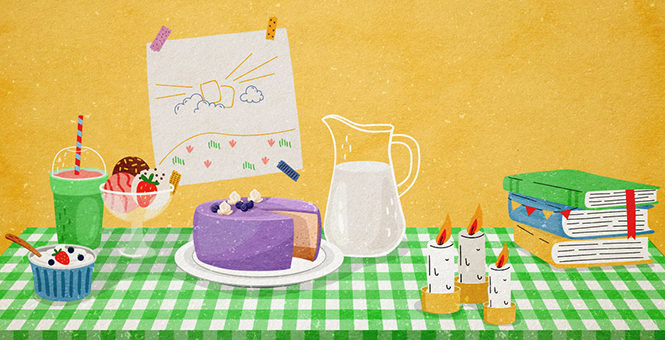As we approach Shavuot, it’s hard to believe that our world has been locked down for nearly three months. We made it through Passover, and we’ve made it through Lag BaOmer … but Shavuot? Shavuot, the holiday of burning the midnight oil with a dedicated crew of fellow scholars, of gathering in the synagogue with family and friends to hear the Ten Commandments, of children showing off their summer outfits, of chatting with acquaintances over cheesecake and coffee… Oh, Shavuot, how can we ever celebrate you alone? Well, if G‑d put us in a situation where we must celebrate Shavuot alone, then we most certainly can. Here are our tips for a Shavuot that is both delightful to the soul and pleasant for the person.
1. Decorate the House

As we celebrate at home, it is especially important to make our environment feel as celebratory as possible. Did you know studies have shown that flowers improve your emotional health? Many follow the custom of sprucing up their synagogues and homes with greenery and flowers (read the reason for this, as well as why it is not a Chabad custom), but there is more you can do. Let your crafty side reign free. Create Mount Sinai posters, Torah motifs, and other art to give your home a festive, Shavuot vibe.
Check Out Our Shavuot Vase Craft
2. Cook Up Dairy Delights

A favorite Shavuot custom is enjoying dairy treats, which run the gamut from traditional blintzes to Italian creations with names that are difficult to spell and almost impossible to pronounce. If shopping is difficult, even humble classics like mac and cheese (cooked over a pre-existing flame) or a comforting coffee can do the trick.
Take a Look at Our Shavuot Recipe Offerings
3. Print Up Study Material for Your All-Nighter

It is customary to stay up the entire first night of Shavuot, reading a syllabus of classic Torah texts, known as Tikkun (“fixing”), until just before dawn. Those unable to read Tikkun often study with friends, join classes, or learn on their own. Calculate how many hours you will have from when you conclude your holiday meal until dawn, and make sure you have enough study material to carry you through.
Check Out Our Curated Texts to Print Before Shavuot
4. Prepare an ‘Eruv Tavshilin’

Since the second day of Shavuot is Shabbat, we are allowed to cook on Friday for Shabbat, provided that the food will be ready with ample time for the food to be consumed before sunset (if a troop of guests happens to trudge into your home).
However, this is only permissible if we set aside two foods (one cooked and one baked) for Shabbat before the onset of the holiday in a special procedure known as eruv tavshilin.
Click Here for Eruv Tavshilin Procedure and Texts
5. Light Holiday Candles

Shavuot is a holiday, and it is ushered in by lighting candles (married women light at least two, and single girls light one). If you are sheltering in place in a male-only household, one of the guys should light candles for everyone. (Note that since the second night is Shabbat, the candles must be lit 18 minutes before sunset from a preexisting flame.)
Print the Appropriate Blessings in Advance
When to Light in My Area
6. Hold Your Own Services

With the exception of Kaddish, the Barechu call to prayer, the repetition of the Amidah, and the Torah reading, you can pray anywhere in the world, including your home.
So make sure you have a siddur handy (Shavuot services are all in the standard Chabad Siddur) and a place set aside to serve as your ad hoc shul. If you are with others, pray together. Even though you don’t make a minyan, you can say the words and sing the songs together.
Get Familiar With the Order of the Prayers
7. Read the Ten Commandments

When the Ten Commandments were communicated on the very first Shavuot in history, all Jewish souls (including yours and mine) were present. The Rebbe—Rabbi Menachem M. Schneersohn, of righteous memory—encouraged every living Jew, from newborns to nonagenarians and beyond, to be present during services on the first morning of Shavuot, when we relive the experience by reading the record of the event from the Torah scroll.
This year synagogues are closed and most of us are unable to attend a Torah reading. We can, however, read the entire Torah portion (Exodus 19:1-20:23 on the first day and Deuteronomy 14:22-16:17 on the second day, followed by Numbers 28:26-31) from a printed Chumash. You are certainly encouraged to read the Ten Commandments aloud in Hebrew or English while everyone stands by respectfully.
Read Our Practical Guide to Reading the 10 Commandments at Home
8. Prepare Games and Fun for Kids

Synagogues typically prepare a full program for children, making the Ten Commandments meaningful, fun, and memorable. We can do the same at home. Click the link below to access games, a craft, and a fun treat—all of which can be prepared with minimal effort before the onset of the holiday.
Print the Shavuot Party Packet
9. Don’t Forget Yizkor

The second day of Shavuot is one of four annual times the Yizkor memorial prayer for our dear departed ones is recited in the synagogue. This Shavuot, as on Passover, we will recite Yizkor privately at home, secure in the fact that this is what G‑d wants from us right now, taking comfort in knowing that our loved ones would surely want us to stay safe.
Text and Other Info for Yizkor at Home
10. Tell Stories About the Baal Shem Tov

Shavuot is the yahrzeit of both King David and the Baal Shem Tov, founder of the Chassidic movement. Many make it a point to tell stories about the Baal Shem Tov over the holiday.
Choose a Story to Print from This Index
11. Do Kiddush Levanah After Shavuot Ends

Kiddush Levanah, the sanctification of the moon, is performed once a month, during the first part of the lunar cycle. Said outdoors at night, Kiddush Levanah is a meaningful ritual highlighted by a Hebrew blessing, selections of Psalms, and other prayers, often followed by joyous dancing. The ideal time to say this prayer is Saturday night, when we are still dressed in our Shabbat finery. The best time to say it this month is on Saturday night after Shavuot has ended.1




